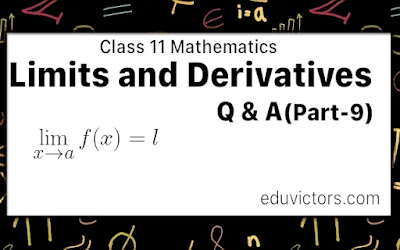THEOREMS ON DIFFERENTIATION
CBSE Class 11 - Mathematics - Limits and Derivatives Part-9
You have learnt about finding derivatives using the first principle in part-7 and part-8. Let us proceed further. Here is a summary of theorems on differentiation.
Theorem I :
$ \frac{\mathrm{d} }{\mathrm{d} x}[kf (x)] = k d/dx [f (x)] $, where k is a constant
Theorem II :
$ \frac{\mathrm{d} }{\mathrm{d} x}\left [ f_{1}(x)\pm f_{2}(x)\pm f_{3}(x)\pm ....... \right ] = \frac{\mathrm{d} }{\mathrm{d} x}[f_{1}(x)]\pm \frac{\mathrm{d} }{\mathrm{d} x}[f_{2}(x)]\pm \frac{\mathrm{d} }{\mathrm{d} x}[f_{3}(x)]\pm ....... $
Theorem III :
$ \frac{\mathrm{d} }{\mathrm{d} x}[f(x)\cdot g(x)] = f(x)\frac{\mathrm{d} }{\mathrm{d} x}[g(x)] + g(x)\frac{\mathrm{d} }{\mathrm{d} x}[f(x)] $
Theorem IV :
$ \frac{\mathrm{d} }{\mathrm{d} x}\left [ \frac{f(x)}{g(x)} \right ]=\frac{g(x)d/dx[f(x)]-f(x)d/dx[g(x)]}{[g(x)]^{2}} $
Theorem V :
Derivative of the function of the function: If 'y' is a function of 't' and 't' is a function of 'x' then,
$ \frac{\mathrm{d} y}{\mathrm{d} x}=\frac{\mathrm{d} y}{\mathrm{d} t}\cdot \frac{\mathrm{d} t}{\mathrm{d} x} $
Theorem VI :
Derivative of parametric equations: if x = f (t), y = ψ (t) then $\frac{\mathrm{d} y}{\mathrm{d} x}=\frac{dy/dt}{dx/dt} $
Theorem VII :
Derivative of a function with respect to another function: If f (x) and g (x) are two functions of a variable x, then
$ \frac{\mathrm{d} [f(x)]}{\mathrm{d} [g(x)]}=\frac{\mathrm{d} }{\mathrm{d} x}f(x)/\frac{\mathrm{d} }{\mathrm{d} x}g(x) $
Theorem VIII :
$ \frac{\mathrm{d} y}{\mathrm{d} x}\cdot \frac{\mathrm{d} x}{\mathrm{d} y}=1 $
Theorem IX :
The general power rule: If y = f [g(x)] = [g (x)]n then the chain rule yields
$ \frac{\mathrm{d} y}{\mathrm{d} x}=\frac{\mathrm{d} y}{\mathrm{d} u}\cdot \frac{\mathrm{d} u}{\mathrm{d} x}=nu^{n-1}\cdot \frac{\mathrm{d} }{\mathrm{d} x}g(x)=n[g(x)]^{n-1}\cdot \frac{\mathrm{d} }{\mathrm{d} x}g(x) $
If n is any real number and g' (x) exists, then $ \frac{\mathrm{d} }{\mathrm{d} x}[g(x)]^{n}=n[g(x)]^{n-1}\cdot \frac{\mathrm{d} }{\mathrm{d} x}g(x) $
You might think of the general power rule as power in front of the function, reduce the power of function by one, times the derivative of a function. A common error is to ignore the $ \frac{\mathrm{d} }{\mathrm{d} x}g(x) $ term in the general power formula.
👉See Also:
Ch5: Complex Numbers (Part 1) - Solved Problems
Ch 13 Limits and Derivatives (Q & A ) Part -1
Ch 13 Limits and Derivatives (Q & A) Part - 2
Ch 13 Limits and Derivatives (Q & A) Part - 3
Ch 13 Limits and Derivatives (Q & A) Part- 4
Ch 13 Limits and Derivatives (Q & A) Part-5
Ch 13 Limits and Derivatives (Q & A) Part-6
Ch 13 Limits and Derivatives (Q & A) Part-7

No comments:
Post a Comment
We love to hear your thoughts about this post!
Note: only a member of this blog may post a comment.